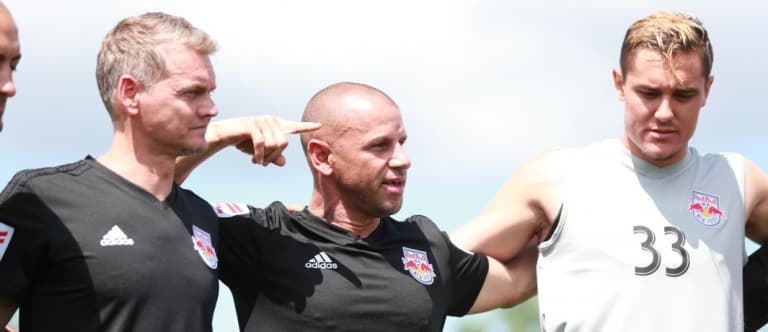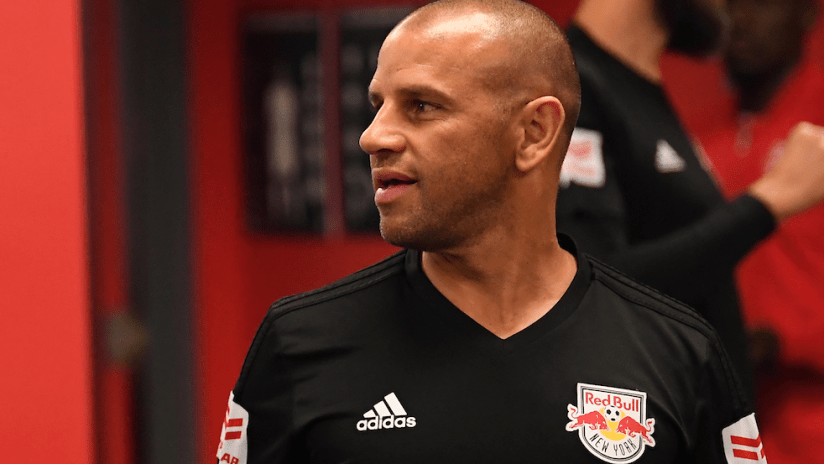On Friday, Chris Armas became the 16th head coach in New York Red Bulls history following Jesse Marsch’s departure to “pursue a new opportunity.”
Fans know Armas as Marsch’s right-hand man, the club’s top assistant for the last three-and-a-half years.
From humble, hard-working beginnings to becoming one of America’s greatest midfielders to his ascension up the coaching ranks, here are 10 things to know about Chris Armas.
He’s Chris from the block
Armas’ debut as an MLS head coach begins in the Bronx against New York City FC Sunday (7 pm ET | FS1 - Full TV & Streaming info), the borough he was born in. It was in the Bronx where Armas learned the virtues of hard work from his baseball-loving father, who would walk a mile to work.
“My dad always had a saying that you have to earn it,” Armas said. “He always said it. He would take the soccer ball in the backyard and he’s a guy who grew up playing baseball in the Bronx, and with his heel he’d hit the ball the other way and I would chase him and he’d hold me off and I wouldn’t stop.”
Rough Rider
Before a storied MLS career, Armas, who grew up in Brentwood, Long Island, was part of a star-studded Long Island Rough Riders team that defeated the Minnesota Thunder in the USISL’s Pro League Championship in 1995.
On one team were future MLS stars, including Tony Meola, current Portland Timbers head coach Giovanni Savarese and Jim Rooney.
Best XI x 5
Armas was drafted by the LA Galaxy and spent his first two years there, but his biggest impact was felt as an original member of the Chicago Fire. The heart and soul of the club’s formative years, Armas helped lead the Fire to the MLS Cup title in 1998 and was named MLS Best XI for the first time that year.
He’d earn Best XI honors in each of the next three seasons as well, a streak snapped by an ACL injury that forced him to miss most of the 2002 season. In 2003, Armas was again named Best XI and earned the MLS Comeback Player of the Year.
Armas was inducted into the “Ring of Fire” in 2009.
Best U.S. player to not feature in a World Cup?
Armas might go down as the best U.S. national team player to never play in the World Cup. He emerged on the national team scene after the 1998 World Cup, making his debut against Australia on Nov. 5, 1998. He was capped 66 times, helping the U.S. to a pair of Concacaf Gold Cup titles and was named the U.S. Soccer Athlete of the Year in 2000.
Armas was named to the 23-man roster for the 2002 World Cup, but he suffered a torn ACL in his right knee during the first half of a 2-1 win over Uruguay in the buildup to the tournament. It was a similar injury that sidelined him from the 2000 Olympics.
“I'm extremely disappointed for Chris," then-U.S. coach Bruce Arena said at the time. "Chris has been an outstanding performer with our team and a fine professional. We are indebted to his service to the U.S. national team. He will certainly serve as an inspiration to his teammates this summer."
Shut ‘em down
As a player, Armas took pride in shutting down some of the league’s best attacking midfielders. And as arguably the best defensive midfielder of his generation, he did that on the regular.
Take 1998 for example, when legends Marco Etcheverry, Mauricio Cienfuegos, Preki and Carlos Valderrama combined for 35 goals and 60 assists in 100 total games. However, when they went up against Armas and the Fire? A combined two goals and four assists in 15 games, including Chicago's triumphant playoff run.
Golden goal memories
Although he wasn’t a scorer by nature, Armas netted one of the most memorable goals in Chicago Fire history, tapping in the golden goal in a win over the New England Revolution to send the Fire to the 2003 MLS Cup.
“He just had an uncanny ability to just lead by example,” Red Bulls sporting director Denis Hamlett said. “I think when you watched him play, I always go back to the game against New England when he scored the winning goal and takes his gloves off and he throws them in the air as he’s running back celebrating and just the joy that he had.”
A coach on the field
Hamlett knew that Armas had the makings of a coach as a standout player, a hard-working central midfielder who wore the captain’s armband. Hamlett saw it first-hand as a Fire assistant coach from 1998-2007 and served as the club’s head coach for two years.
“He brought it every day, in training sessions, on the field, he just led by example and you can see his ability to sort of connect with people and bring them on board and get them to push themselves to the next level,” Hamlett said. “When you’re a captain you see signs that these are qualities you’re going to have to be a good coach. From Day One, he had it. He had it when he played with the national team, he had it when he played with Chicago.”
Hamlett was so impressed he made Armas a Fire assistant coach in 2008.
The beginning of a beautiful friendship
Armas and Marsch didn’t just team up on the Red Bulls coaching staff. They shared the midfield for the Fire in eight seasons before Marsch left for Chivas USA in 2006.
They reunited with the Red Bulls where they were virtually inseparable over the last three-and-a-half years.
“Four years, like we spent too much time together me and Jesse, on the phone, on the trips, but what a time we spent together,” Armas said. “And he epitomizes leadership. I’ve been taking it in, learning along the way as a player and it’s worked for me. I’ve led teams to trophies, I’ve been part of winning in a leadership role.”
End of an era
After discovering he had arthritis in his hip and a torn labrum during the preseason, Armas announced the 2007 season would be his last, a retirement made official on Nov. 13 of that season.
“You have the Peter Nowaks or the Cuauhtemoc Blancos, who are famous or amazing players on the field,” former Fire defender C.J. Brown said at Armas’ retirement. “Chris is like them, but he’s not looked at in the same starlight. But man, there are big shoes to fill when you lose Chris Armas.”
Marsch, who at the time was a Chivas USA midfielder, honored Armas in a Chicago Fire tribute video.
“So, in the beginning years I think Peter Nowak was kind of the Chicago Fire, but then as he’s moved on, it’s been Chris Armas and I think that will be the toughest thing for the organization, for the fans, for Chris,” Marsch said. “What’s life like without Chris Armas now for the Fire?”
Fruitful coaching tree

Armas takes some time with his players | New York Red Bulls
Armas cites some of most legendary coaches in MLS and American soccer as influences who helped shape him as a future coach. The list includes Bruce Arena, Dave Sarachan, Bob Bradley, Octavio Zambrano, Juan Carlos Osorio, Alfonso Mondelo, Bob Montgomery and Manny Schellscheidt.
“I was always listening and taking. Some of it was ‘hey that’s really good and some of it was Chris, don’t ever do that. I didn’t like the way he treated that guy. There was a different way he could have handled that,’” Armas said. “Sometimes the sessions were really good and sometimes those coaches were really organized and had something different every day and it was really good. Guys like Bob Bradley, a fantastic man manager and the details. It was relentless and I loved that. That’s going to be part of me.”













